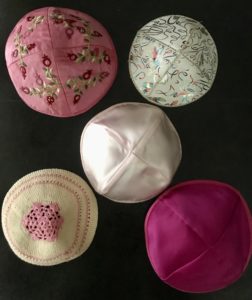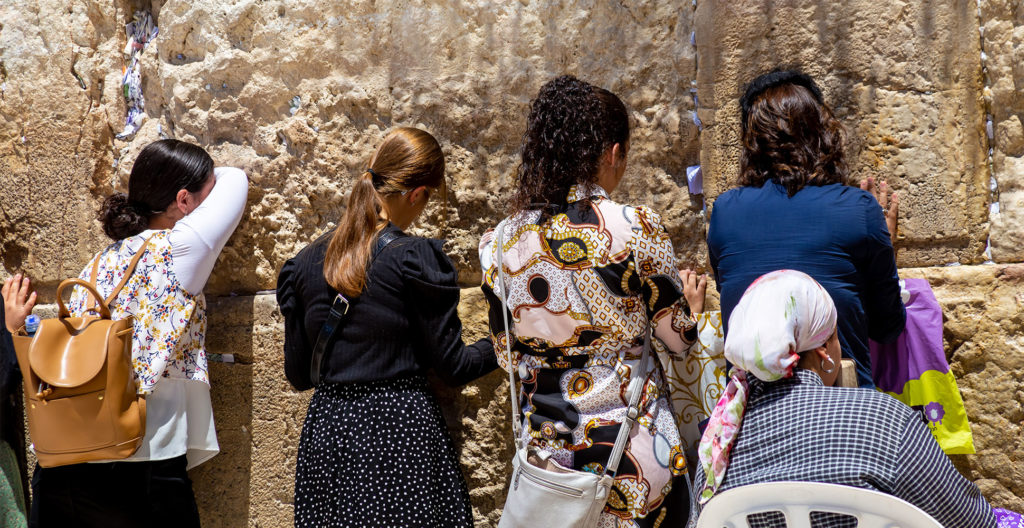If we look back at the evolution of practices within Jewish society, we can see that there have traditionally been fixed roles for the different sexes.
Men’s and women’s responsibilities and obligations were different but no more or less important than each other’s.
With the development of Progressive Judaism the shift is towards complete gender equality. (See Subdivisions within Judaism).
It is interesting to note that one receives one’s Jewish identity from your mother – the rationale being that it is visibly obvious that you are growing in your mother’s womb whereas there is no visible proof of your male parent!
There are also several female role models in the Torah – some examples are The Matriarchs: Sarah, Rebecca, Rachel and Leah; Moses’ and Aaron’s sister, Miriam; Deborah the Judge; Huldah the Prophetess and Queen Esther, the heroine of the Purim story.
Below, I have clarified the role of women within both traditional and more modern Jewish life.
Orthodox point of view
The primary role of the woman is as a wife and mother so she is responsible for the Jewish home and early education of the children.
These demands have to take precedence and therefore women are exempt from a number of public obligations including public prayer. ( This follows the biblical quotation in Zechariah 12:12 – ‘men and women are to kept apart during religious functions.)
In practice this means that women sit separately to men in Orthodox Synagogues either upstairs, at the back behind a screen and occasionally to one side.
In Orthodoxy this is not meant to show inequality or to imply disrespect for women but rather it is based on the Jewish sense of modesty and reverence.
Women are also not called to read from the Torah and although most Orthodox Synagogues have a female equivalent of a Bat Mitzvah called a Bat Chayil (daughter of worth), this happens at the age of 12, usually involves a group of girls rather than the individual and takes place on a Sunday afternoon, not on Shabbat. (See Bar/Bat Mitzvah). It entails reciting psalms or special readings rather than reading the main prayers and the Torah portion.
Point to note- Although women are allowed to study Torah, they are not obliged to do so, which has sometimes led to a general neglect of women’s education including learning Hebrew, so that they may be unable to follow services. Inevitably therefore their role in religious Synagogue life is usually a passive one.
However when some Orthodox women recently pressed their Rabbis for the right to lead prayers and read from the Torah, it was granted, albeit for women’s services only.
In Orthodoxy the authorities often declared that women reigned supreme in the home. After all, one could argue that the woman’s role in feeding and supporting the man enables him to fulfil his religious obligations. A balance of power is therefore achieved between the sexes: the woman’s high position in family life and low status in religious matters is in contrast to the men’s low status in family life and high position in religious matters.
Reform/ Progressive point of view
Women are regarded as the religious equal of men, entitled to the same privileges and liable for the same responsibilities, whether in Synagogue, at home or in public.
In an age where women are prominent in all spheres of public life and have become leaders of countries, it seems inconceivable that full rights should not be extended to Jewish women.
In practice, men and women sit together, women can read from the Torah, lead prayers, be Bat Mitzvah, be counted as part of a Minyan and become Rabbis.
These are not seen as concessions but as their natural rights which were denied in previous generations.
They are also given equal rights in matters of status such as divorce proceedings (in Orthodoxy a woman is only allowed a divorce if the husband grants her a ‘get’ so often women were ‘chained’ and unable to remarry without this).
In recent times, women have started to wear the ritual prayer clothes in some Synagogues. Some examples are below:

To summarise, in Reform and Progressive Judaism, women have equal importance to men in every way.



